Lao Diaries- Mountains and time travel to 1800AC ラオス日記2-山中山で1800年にタイムスリップ
The last evening in the Luang Prabang after publishing the previous post I worked with a local chef and a street food vendor on my Matcha recipe project.
前回のブログポストの後、ロンプロバング最後の晩に、私の抹茶プロジェクトで、現地のシェフと、屋台のケーキ屋さんに協力してもらい、抹茶を使ったラオス料理に成功。
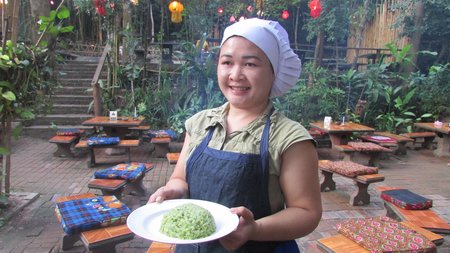
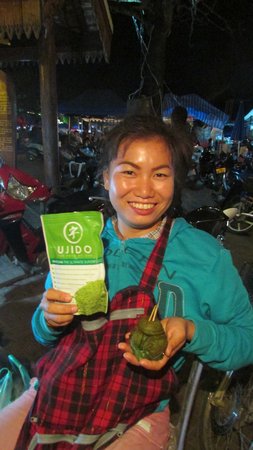
The next day, we went back to the lovely Vietnamese consulate and we got our Vietnamese visas! If you are ok to wait for 3 days the visa fee for 30 days is $40, you can get it for $45 in 2 days (we opted for that, if not we had to wait over the weekend) and you can also get it the next day for $70. We checked the route from the Luang Prabang to Hanoi on the rough map on the wall. A kind consular gave us a Vietnamese map as well.
翌日、私達は、感じの良いベトナム総領事館に戻り、ビザを無事手にした。申請から3日待つと30日の観光ヴィザは40ドル、2日の場合は、45ドル。(私達は週末を越さないよう、このオプションを選択)、翌日サービスの場合は70ドルだった。私達は壁に貼ってあるロンプロバングからハノイまでの簡略地図でだいたいのルートをチェック。優しい係員はベトナムの地図をくれた。
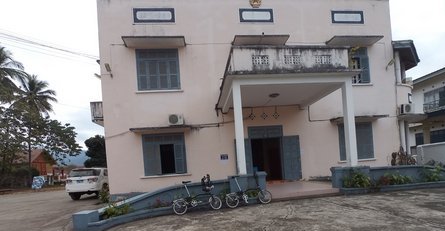
We had a last breakfast in Luang Prabang in the same stall where Sunil had “Banana Oreo coffee” in the previous morning (10,000 Kip or $1). It was surprisingly tasty. Sunil ordered the same drink and we order 2 sandwiches (20,000 Kip). We didn’t know how much we would miss the simple sandwiches at that point.
私達は、ロンプロバング最後の朝食を前日と同じ屋台で取った。ここでは、バナナオレオコーヒーを売っている。(10,000キップ=約1ドル) どんな味かと思いきや、これがなかなか美味しい。スニルは前日同様、このバナナオレオコーヒーを注文。私達はこの日もサンドイッチを注文。(20,000キップ) この時点で、私達は、このシンプルなサンドイッチがとっても恋しくなるとは、思っていなかった。
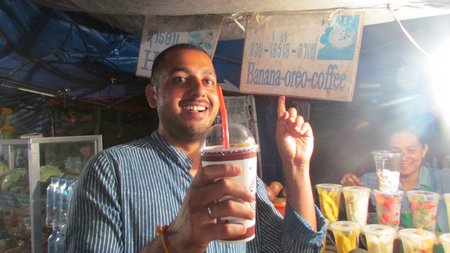
![IMG 0696[1]](http://sushiandsambar.com/wp-content/uploads/2016/02/img_06961.jpg)
We went back to the guest house. We said good bye to the lovely family (the mother has the best smile in Luang Prabang) of the owner and the funny polish guy who stayed in the same guest house. (He was very happy when we saw him as his Chinese girl friend will arrive on that day. He has been in south east Asia for 6 years and don’t have a plan to go back to his country. He has a blog 25litrs.com and as the blog title tells you, he doesn’t carry much with him.)
私達はゲストハウスに戻り、素敵なゲストハウス家族(この家のお母さんの笑顔は、ロンプロバングで1番!)とゲストハウスに滞在している面白いポーランド人に別れを告げた。(この日、中国からガールフレンドが来る予定だった彼は、朝からご機嫌。かれは、6年間東南アジアに住んでいて、ポーランドに帰る気は全くないそう。彼のブログ25litrs.comのタイトルから察せるように、彼は身軽に旅をしていた。)
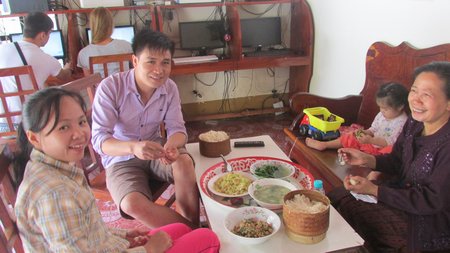
We started cycling towards Pak Xing, a small village shown on google maps.
私達はグーグルマップにあった小さい村 パクシンを目指した。
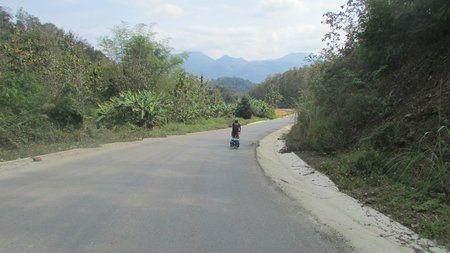
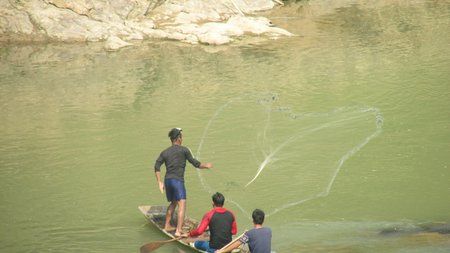
Sunil occasionally stopped and asked local people. Guess what? We met an Indian man. We know that we meet Indians wherever you go but what is the probability that you would stop and ask a second generation Indian settled in a small village in Laos to ask for the route?
スニルは時々自転車を止めては、現地の人にルートを確認した。なんと、インド人にも尋ねることに。インド人は世界どこに行っても見かけるが、ラオスのこの小さい村で、第2世インド人に出会って、道を聞く偶然はそうそうあるものではない。
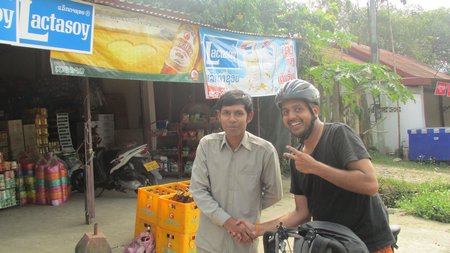
More we went far from Luang Prabang, the road was getting worse and we started worry about our wheels of bike.
ロンプロバングから離れれば離れるほど道が悪くなり、私達は自転車がパンクしないか心配になった。
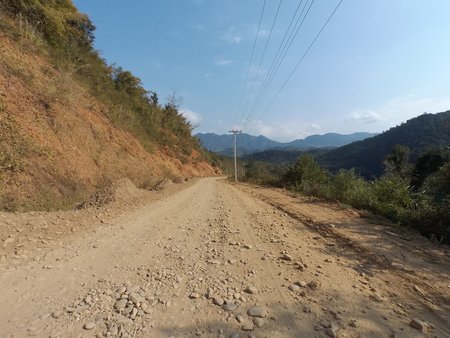
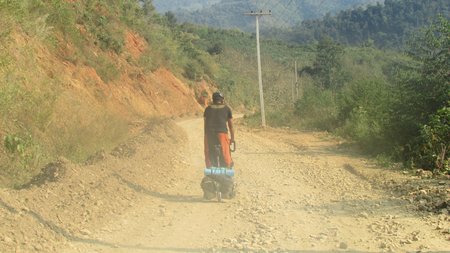
But we had a really good ride in country side. We noticed that Lao people love to hear music loud. Wherever we go we hear the Lao music from here and there any time of the day. The scenery changed gradually and we were cycling in the mountain. It was very pleasant at the beginning and I learned how to say “I am loving this” in Tamil and Sunil learned how to say “This is a bad road” and “this is a good road” in Japanese.
そうは言ってもも、田舎でのサイクリングは最高だった。旅の途中気づいたのは、ラオスの人々は音楽をボリューム一杯にして聞くのが好きだということ。どこにいっても、それが何時であっても、どこからかラオス音楽が聞こえてきた。風景が徐々に変わり、私達は山中を走っていた。最初のうちは快適で、私は「このサイクリングを楽しんでる」というタミル語をスニルから習い、スニルは「道が悪い」「道がいい」という日本語を覚えた。
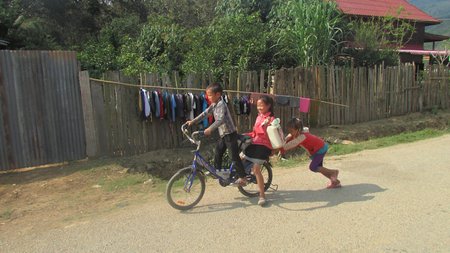
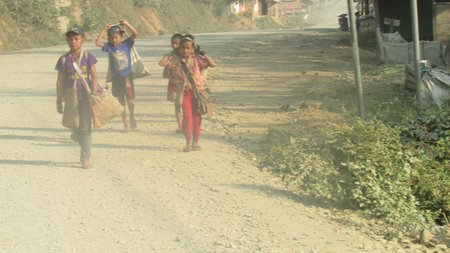
We stopped for a lunch and only things we could find there was noodle soup which was good. We had two bowls of simple noodle soup ($2) with some raw vegetable and salad leaves.
途中で、お昼休憩。メニューはなく、あるのはスープ麺のみ。味はなかなか。私達はこのスープ麺とそれについてきた生野菜とサラダの葉をボリボリ。
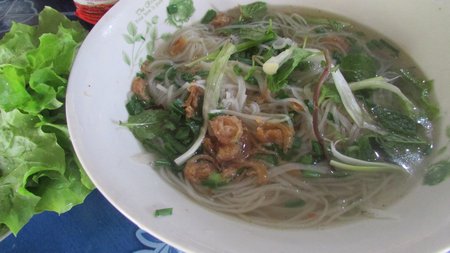
What waited for us after the lunch was the series of up and down hills. That was a sort of ride which Sunil enjoys. For me… definitely not… I kept saying “Blimey!” or “Bloody hell!”
お昼の後に私達を待ち受けていたのは、登り坂と下り坂の連続。スニルはこういう道が好きなのだが、私はというと、、、とんでもない!坂道は断り!「なんなのこれはあ!」「くそお〜!」と言い続けることに。
We went up.
坂を登って、、、
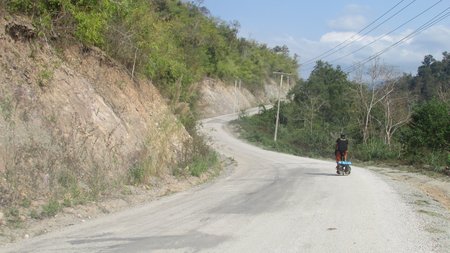
We went down.
坂を下って、、、
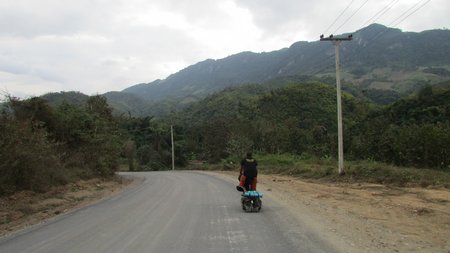
And up.
また登って、、、
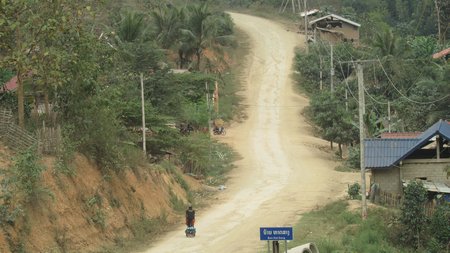
And down.
また下って、、、
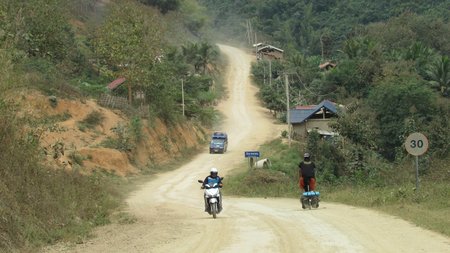
We enjoyed some loooong down hills. Nothing can be better than this! It paid off the tough ride of up hills.
時々現れる長〜い下り坂は最高。こんなに気持ちのいいことって、他にないんじゃないかと思うぐらい。急な坂道を登った甲斐があるというもの。
We occasionally fooled and thought that we reached the top of the mountains and took a selfie to cherish the moment, but when we turned the corner, we realized that we were too optimistic and we could see another uphill in front of us.
私達は、時々頂上に着いたと思い、セルフィで写真を撮って喜んだのだが、道を曲がった瞬間、別の山が待ち受けていて、自分達が早まって喜んだことに気づき、しばし泣くはめに。
We passed small villages and everyone waved and greeted us saying “sabaidi” (hello). It seemed that people in country side are far more friendly than in the city.
小さい村々を通ると、誰もがラオス語で「サバイディ!」と言って、手を振ってくれた。田舎に行けば行くほど、人が親切な感じがした。
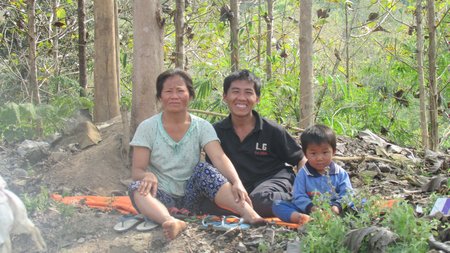
After 4 o’clock, we decided to pitch a tent in a small village.
4時を過ぎたところで、小さい村に到着すると、そこにテントを張ることに決めた。
![IMG 0720[1]](http://sushiandsambar.com/wp-content/uploads/2016/02/img_07201.jpg)
We saw local people gathering in one of the small shops. Ladies and children were sitting around a big table. We asked if we can pitch our tent in front of the shop. As always, all the conversation happened with gestures and some simple English and only phrase I learned in Lao, “Can I pitch a tent here tonight?” They talked each other and one lady asked us to follow her. She showed us an empty meeting room in the center of the village and told us that we could stay there on that day.
小さい店で村の女性や子供たちが大きいテーブルを囲んで座っているのを見つけると、私達は、早速、テントをを店の前に張らせてもらえないか聞いてみた。いつものように会話は主にジェスチャー、簡単な英語と私が唯一習ったラオス語の表現「今晩ここにテントを張ってもいいですか?」だった。村の女性達が何やら話し始めたかと思うと、その中の一人が、立ち上がって、彼女について来るように言った。ついて行ってみると、村の真ん中に空っぽの集会所のような建物があり、そこに泊まっても良いと言ってくれた。
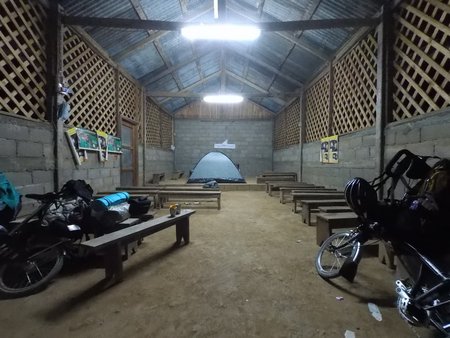
We put our bikes and luggages inside the hall and joined the ladies to sit. Suddenly an old man appeared from a house and he gave us a private guided tour of the village. First, he took us to an abandoned temple. It was a beautiful but there were no monks. Then he took us to the river right behind his house where he swims every day.
早速そこに自転車と荷物を置くと、村の女性達のところに戻って座った。するとどこからかお爺さんが現れ、村の案内をしてくれた。まずは、僧侶も誰もいない美しいお寺へ。それから彼の家の裏にあり、彼が毎日泳ぐ川へ連れて行ってくれた。
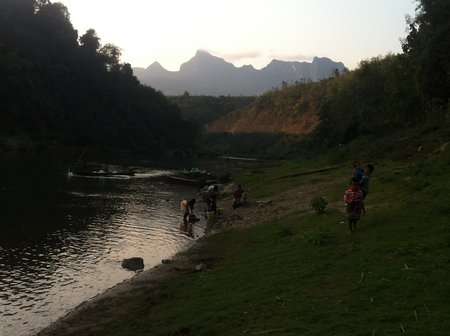
It was so clean and beautiful.
川の水は澄んでいてきれいだった。
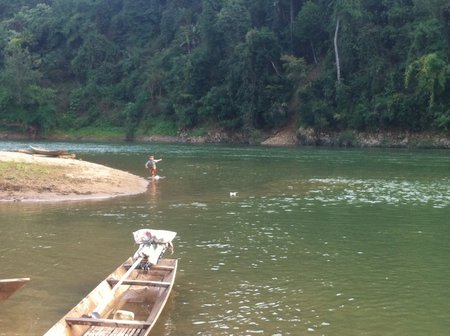
You could see mangroves.
マングローブがあちこちに見えた。
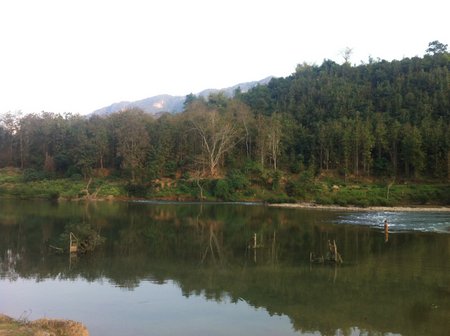
Local people were swimming and fishing. We were tempted to jump in the river as we were so sweat and felt filthy but the old man had his own agenda and didn’t stop walking and asked us to follow him.
地元の人が泳いだり魚を取っていた。体が汗だらけで汚れていたので、川に飛び込みたかったのだが、お爺さんは、見せたいものがまだまだあるらしく、立ち止まってくれず、ついて来るようにと言ってどんどん歩いていく。
Then he took us to the local people who were making brooms using grass. I immediately joined and tried to help them.
道に戻ると、次は草で箒を作る人々のところへ連れていってくれた。早速中に入って手伝ってみた。
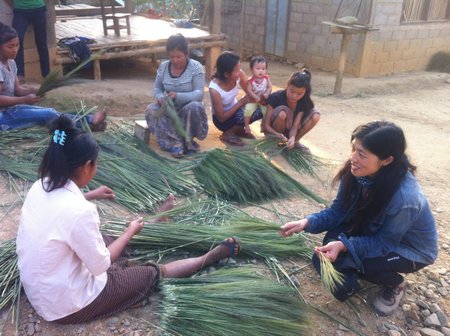
Then after, he took us to another place where some ladies were weaving. It looked very easy but it was not easy at all. I wish I could learn properly. The final product was very beautiful.
それから連れていってくれたのは、織物をしている女性達のところ。簡単そうに見えたが、難しい。いつかちゃんと習ってみたい。仕上がった製品はとても素敵だった。
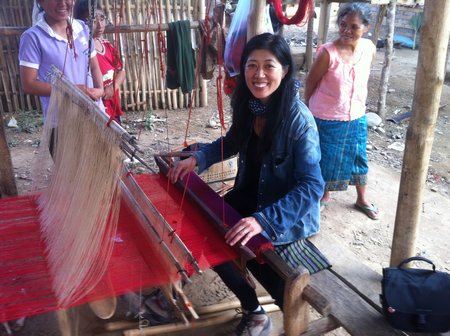
We came back to our meeting hall. The old man told us that we could use his outside bathroom. I asked if I could take a shower and he said yes. I felt that it was the best shower I ever took in my life! I used cold water using a bucket. I felt so refreshed and clean after was… but I used too much water and Sunil was told off by the old man and had to take his shower in another house. Most of the houses in the village had bathroom and kitchen outside and they were kept clean and tidy.
集会所に戻ると、お爺さんは、外にあるお風呂件トイレを使ってもいいと言ってくれた。シャワーを浴びてもいいと言うので、早速おけで水浴びをする。今まで浴びたシャワーで、1番!と思えるほど気持ちがよかった。フレッシュできれいさっぱりした。ところが、、、水を使い過ぎたようで、私の代わりにスニルがお爺さんに注意されたよう。スニルは隣のうちで水浴びをすることになった。村のほとんどの家の台所とお風呂は外にあった。それはきれいで清潔に保たれていた。
We started pitch a tent in a hall. Curious and naughty small children banged the doors and popped in their heads and kept bothering us until we switched off the light.
私達が集会所にテントを張り始めると、興味深々でいたずらっ子の子供達がドアをバンバン叩いたり、入り口から覗き込んだりして、私達が電気を消すまで静かにしてくれなかった。
The next day, we said good bye to the old man and local children and left the village early in the morning. We pedaled up the hills again.
翌日、お爺さんと子供達に別れを告げ、朝早く村を出て、またしても山の坂道を走り始めた。
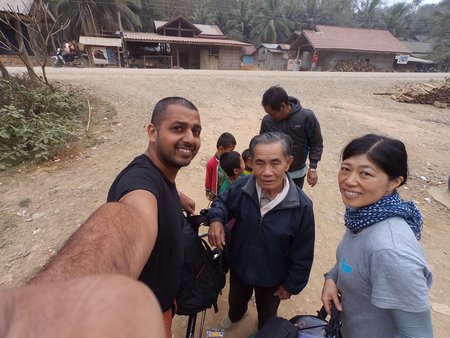
We had a breakfast in a small shop. Our breakfast was…”Noodles!” This shop had a best chillie oil made by the lady owner. Her son who speaks English came in and talked to us. We told him that his mum makes the best chillie oil we had so far. He and his fiancé are teachers in government schools. They invited us to their wedding which happens in coming November.
私達は小さい店で朝食を取った。朝食は、「スープ麺!」この店には女主人手作りの美味しいチリオイルがあった。英語を話すこの女主人のの息子が店に入ってきたので、彼のお母さんの作ったチリオイルが今まで食べた中で1番!と伝えた。彼と彼のフィアンセは中等教育の先生。11月に行われる結婚式に招いてくれた。
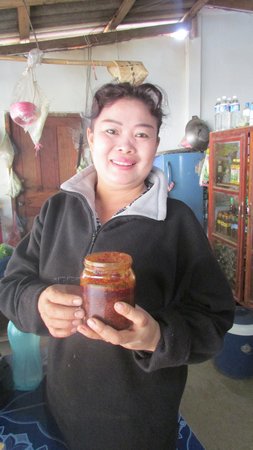
After the breakfast, we went up and down many hills again and again. We were still cycling along a beautiful river. You could see a great panoramic view behind the river. A series of mountain ranges continued on your right. But the roads were totally unpaved, dusty and mud all over our body, bike and luggage.
朝食後また、山を越え谷を越えが続く続く。山々が重なり合う、素晴らしいパノラマの景観を横目に、私達は美しい川沿いをひたすら走った。しかし、道は舗装されていなくて、土埃や泥が体、自転車、荷物にかかった。
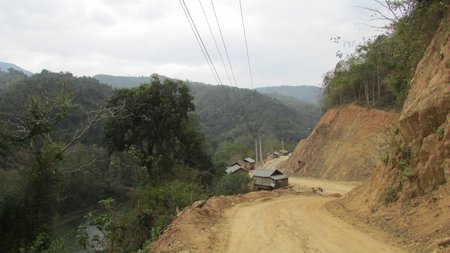
We occasionally believed again that we were at the top of the mountain. We passed many similar villages. The houses were made of bamboo and woods. Most of the villages seems to make brooms and do weaving. People waved us and said “sabaidi” wherever we went. Children were playing using old tiers and running around. They ride much bigger bicycle than them and also motor bikes.
私達は、何度もまた山頂に来たと思ってしまった。似たような村々をいくつも通り過ぎた。家は竹や木で建てられているものが多かった。多くの村が箒を作ったり織物をしていた。どこにいっても、「サバイディ!」と言って、手を振ってくれた。子供達は古いタイヤを転がしたり、走ったして遊んでいた。小さい子供が自分達の体より大きい自転車乗ったり、オートバイに乗ったりしていた。
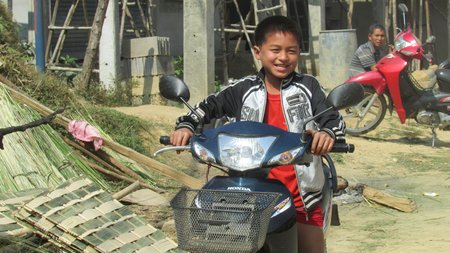
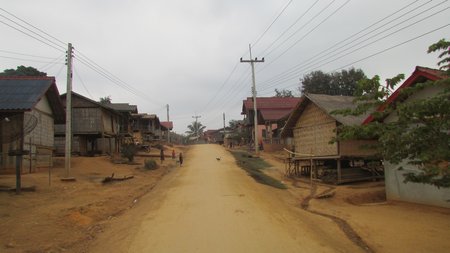
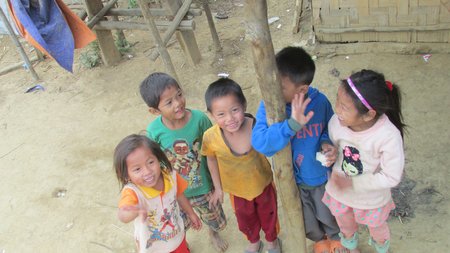
Children seemed to be very happy. It reminded of me a Japanese TV programme which I watched long time back. They showed different tribes in the different countries every episode and the end of the programme, they interviewed local children and asked them what they want to be in future and where they want to go. They asked the same questions to Japanese kids as well. Most of the tribe children said they want to be like their parents and they don’t want to go anywhere else as they are very happy where they are. Japanese kids on the other hand had different dreams and they said that they want to go either bigger cities or different countries. Sunil and I talked about the advantage and disadvantage of getting information, which again reminded of me one scene from the film “The Economics of happiness” directed by English lady who traveled Ladakh in India more than 30 years. She interviewed a man 30 years back and again asked same question to the same man after 30 years later. He told her that he has everything and very happy but the same man told her that he doesn’t have anything and he is poor although nothing has changed except he knows more about onside world. The film suggested us to go localization rather than globalization and it was interesting to watch.
子供達はとても幸せそう。彼らを見ていて、昔見た日本のテレビ番組を思い出した。いろいろな国の奥地に住む民族を訪れ、番組終了前に、そこに住む子供達に、将来何になりたいか、どこに行きたいかを聞き、同じ質問を日本人の子供達にもしていたのだが、山に住む子供達は、将来はお母さんやお父さんのようになりたい。ここが好きだから、どこにも行きたくないというのが多かったが、日本人の子供達のなりたいものはそれぞれで、もっと大きな都市、または外国に行きたいというのが多かった。スニルと私は、情報のもたらす良い点と悪い点について話し合った。そのときに思い出したのが、イギリス人女性の撮った映画「幸せの経済学」のあるシーン。インドのラダックに30年以上生き続けている監督がインタビューしたある男性は30年前には「私は、なんでも十分に持っていて幸せだ。」と答えていたのに、30年後に同じ男性は、「私は何もなくて、貧しい。」と答えたのだ。彼の持っているものは何も変わらないのだが、外から入る情報はかなり変わってきていた。グローバライゼーションより、ローカライゼーションをという面白い映画だった。
We stopped for our lunch and we had…. again “NOODLES!” We couldn’t find anything but noodles.
お昼休憩を取る。私達のお昼はまたしゅても、、、「スープ麺!」麺以外に何もないのだ。
After our lunch we went up and down hills again and now we started to suffer, our energy was completely draining and we could not see any civilization around.
お昼の後は、また山を越え谷を越え、、、徐々に辛くなってきて、エネルギーが消耗。周囲には全く人気がない。
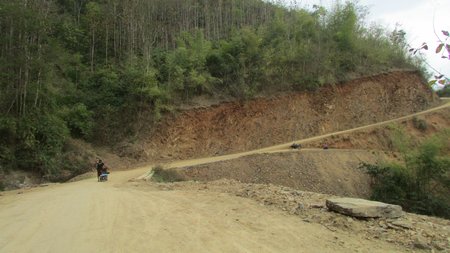
Around 4pm we came to a very small village and we were a bit hesitant to ask the villagers if we could pitch the tent as old ladies, one young boy and few men were smoking and staring at us.
この日も4時ごろ通過したところでちいさいむらに到着。タバコを吸うお婆さん、若い男の子、数人の村の男性が煙草を吸いながら私達をじっと見ていたので、テントを張っていいか聞くのを一瞬躊躇してしまった。
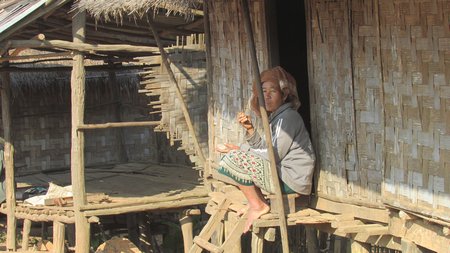
It was getting cold and people were making fire by the road here and there and sitting around the fire.
寒くなってくると、村の人達は道端で焚き火をして、周りに座って暖をとっていた。
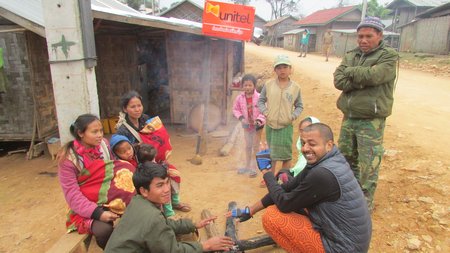
A man guessed our need and gestured we could sleep in the abandoned dusty room. We put our bikes and luggage and joined the villagers and sat by the fire and warmed our cold body.
私達が言いたいことをなんとなくわかってくれた村人が誰も使っていない埃っぽい小屋に連れて行ってくれ、そこで泊まってもいいと言ってくれた。私達はすぐに自転車と荷物をそこに置くと、焚き火をしている村人に加わり、冷えた体を温めた。
When we saw a lady who was making a broom, I joined the lady as she was the only one who was not smoking and carried a gentle smile.
箒を作っているお婆さんを見つけると、私はそこに行ってお手伝いを始めた。村のお年取りの女性で唯一煙草を吸わない、優しい笑顔を持ったお婆さんだった。
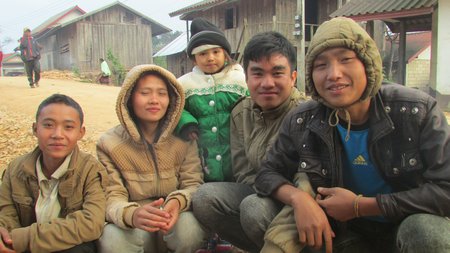
After sometime, a jeep stopped in front of us and a French man and some Lao men came out. They were the researchers who had a meeting with the head of the village on that night. They compare villages to villages all over in Laos. Sunil talked to them and a kind Lao man draw and gave him a rough map written in Lao so that we can show it to local people to ask for the direction toward Vietnam.
しばらくすると、私達の目の前でジープが止まり、フランス人と数人のラオ人が車から降りて来た。彼らは研究者で、この村の村長とその晩ミーティングがあった。彼らはラオス中の小さい村々を訪れ、その違いを調査していた。スニルが彼らと話をすると、ラオ人の一人がラオ語で地名を書いた簡単な地図を書いてくれた。これがあれば、ベトナムに向かう方向を現地の人に道を聞くときに助かる。
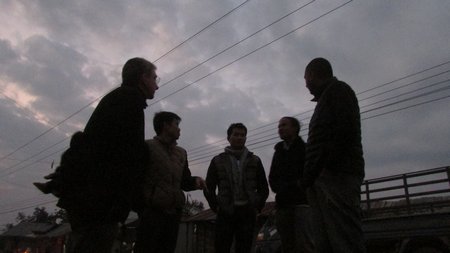
It was getting extremely cold so we went to bed early but my toes and fingers were completely frozen and I couldn’t sleep at all. We wore all the cloths we carried and Sunil slept over my feet, but it was not of much help.
この日は非常に寒く、早めに寝ることにした。が、、、手足の先がすっかり冷え切ってしまい、私は全く寝られなかった。着られるだけのものを全て着て、スニルが足の先を温めてもらったが、あまり効果はなかった。
As soon as hens and chicks started to make sounds early in the morning, I could hear that local people started putting loud music, making fire and talking around the fire. Children started playing football.
朝早く、鶏とひよこが鳴き始めると同時に、村人が音楽を大きな音でかけ、火を起こし、焚き火の周りでおしゃべりを始めたのが聞こえてきた。子供達はサッカーをし始めた。
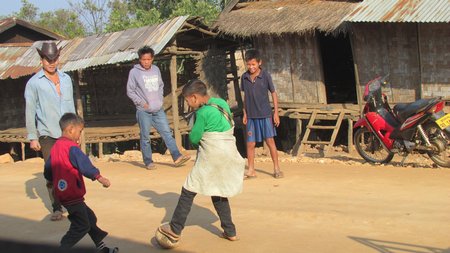
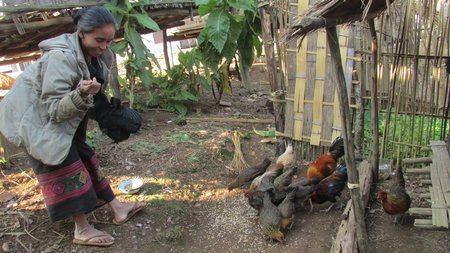
We decided to pack quickly, said good bye to villagers and left the village. Most of the villagers cook using woods in their outside kitchen and make fire by the road to keep themselves warm so you can smell a lovely smell of woods wherever you go through tiny villages. I love the smell of woods in the fire, which reminds of me my grand father’s old house. My mind went through my childhood memory while we were passing the villages.
私達は出来るだけ早く荷物をまとめ村を出ることにし、村人に別れを告げ、その村を離れた。多くの村人は外にある台所で薪を使って料理をするし、道端で焚き火をするので、小さい村々を通り抜けると、火に焚べられた薪の良い匂いがしてくる。この匂いを嗅ぐと私は祖父の古い家を思い出す。村々を通り過ぎながら、子供の頃の思い出をが頭を過ぎった。
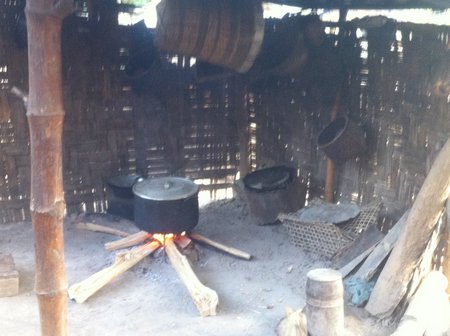
Then we pedaled again up the hills. It seemed that we came even further up and we saw more bamboos and different trees. The kind of trees and plants had changed. We occasionally need to stop and push our bike as the slope was like 45 degree. Our legs and arms were getting tired pushing our bikes with heavy luggages.
私達はその日もまた坂道を走った。さらに高地に来たようで、竹や種類の違う木々や植物を目にするようになった。私達は時折、45度ぐらいの急斜面にかかると、自転車から降りて、押さなければならなかった。重い荷物を積んだ自転車を押すと、手足の疲れを感じるようになった。
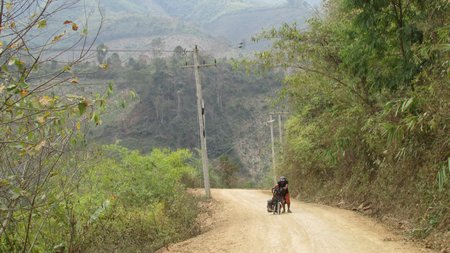
We stopped for lunch and….. Yes we had noodles again. By this point, Sunil would give his property to anyone who offered him a spicy delicious Biriyani. This shop was owned by a young couple with their small baby. They seemed to use different stocks and put more garlic in the soup. It was simple but tasty. They gave us some sticky rice too. We asked if there is any place to sleep nearby and they told us that there is one guest house 1km away from there so we decided to check it out.
今日のお昼も、、、もちろん、スープ麺。この段階で、誰かがスニルに辛くて美味しいビリヤーニをあげたら、スニルは喜んで全財産をあげたはず。この店のオーナーは小さい赤ちゃんのいる若夫婦。他の店と出汁が違うよう。ニンニクの香りがきいていて、シンプルだけどとても美味しいスープだった。私の好きなおこわも出してくれた。近くに泊まる場所があるか聞いてみると、1キロぐらい離れたところにゲストハウスがあるというので、行ってみることにした。
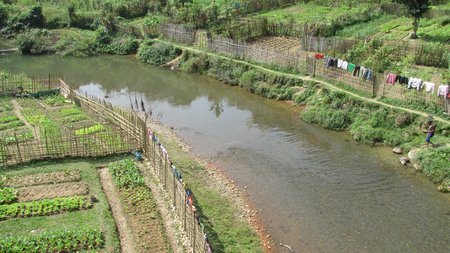
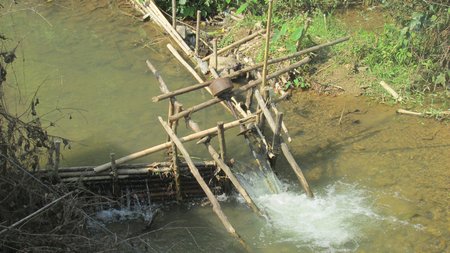
The guest house was owned by a not particularly friendly lady and it was far too expensive for what it was so we didn’t take the room and we went back on the road. The ground rule was, paying for accommodation was a luxury which we would use only during emergency as a last option.We went up one more hill and down and then we came to a beautiful small weaving village.
ゲストハウスのオーナーは、なんだか無愛想なおばさん。部屋の割に値段が高いので、そこに決めるのをやめ、また自転車を走らせた。お金を払って宿に泊まるのは、私達には贅沢なので、非常時だけにすることに決めた。そこから一つ丘を越え、谷を下るとそこは小さい綺麗な織物の村だった。
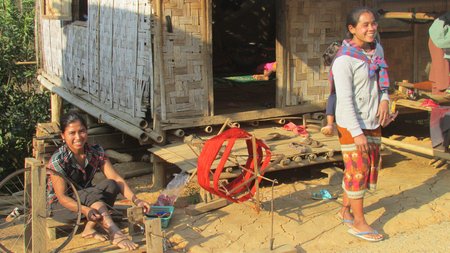
Every house had a weaving machine in front of their house and women were either weaving or making threads like Gandhiji.
村の全ての家の前には機織り機があり、村の女性は機を織ったり、ガンジーのように糸車を回したりしていた。
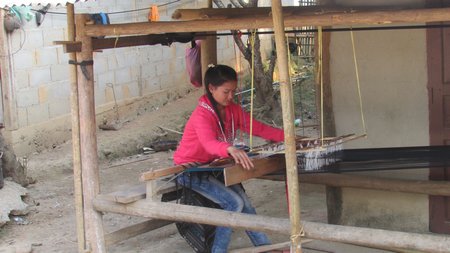
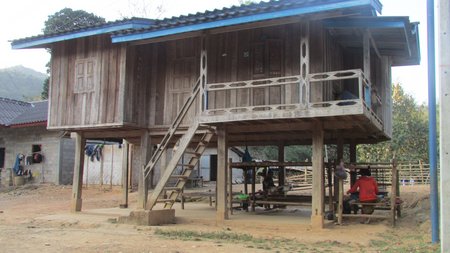
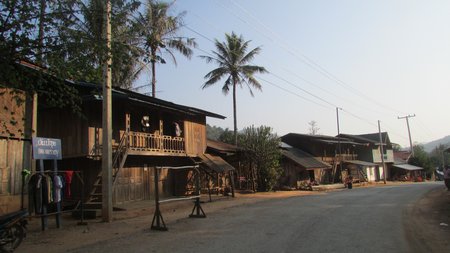
We saw a house with a big space in front and a gentle looking man was washing something in the garden. We asked him if we could pitch a tent in the garden but he suggested us that there is a guest house in the village so we thanked him and went further. The villagers told us that we need to go back 5km to find a guest house. We were very tired and also it was getting dark so we decided to go back to the gentle looking man’s house. We told him that we couldn’t find the guest house and asked him again if we could pitch a tent. He smiled and agreed. He showed us where we could pitch our tent.
私達は家の前に広いスペースのある家の庭で何かを洗っている優しそうなおじさんを見つけると、庭にテントを張らせてもらえないか聞いてみた。おじさんは、村のゲストハウスに泊まるようにジェスチャー。私達はお礼を行って、もう少し先まで行ってみることにした。村の人々は口々にゲストハウスはそこから5キロぐらい離れたところにあると言う。疲れ切っていたし、辺りは暗くなってきたので、私達は優しそうなおじさんの所に戻ってお願いしてみることにした。おじさんに、ゲストハウスがなかったことを伝え、庭にテントを張らせてもらえないか再度聞いてみた。するとおじ、笑顔でいいよと言ってくれ、テントを張れる場所を見せてくれた。
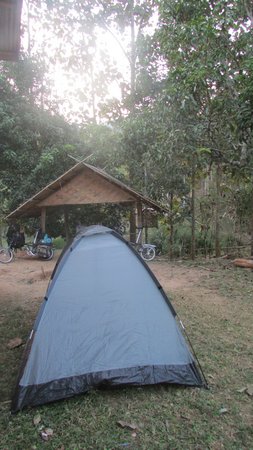
We saw a nice pond, a pig stay and a hen house, vegetable garden, his goats on mountain. Their house was a beautiful ecological house. Sunil and I thought that we would like to live in such a place in future.
おじさんの家の裏には、池、ぶt、鶏小屋、畑があり、山にはおじさんの飼うヤギがあちこちにいた。おじさんの家はエコロジーで素敵な家。スニルと、将来こんな所に住めたらいいねと感嘆の溜息。
While we were putting a tent, the man’s wife came out and made a big fire for us. She soon came back with a roasted local potato which had taste like roasted tapioca. It was hot and yummy.
テントを張っていると、おじさんの奥さんが出てきて、私達のために焚き火を焚いてくれた。しばらくすると次は、焼いたタピオカの味に似た美味しいアツアツの焼き芋を持ってきてくれた。
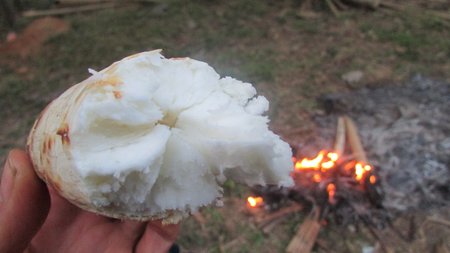
She told us that we should sleep in the house as it gets very cold in the evening. The grand father also came out from the house and asked us to sleep inside. Sunil and I were touched by their kindness and we wished we knew Lao and talk to them more.
奥さんは、夜は寒くなるから、てんとではなく、うちの中で寝るようにと言ってくれた。このうちのお爺さんも出てきて、中で寝るようにとジェスチャー。スニルと私は、このうちの人の優しさに感動して、ラオス語が話せて、彼らと色々話せたらよかったのに、、、と思った。
They invited us for a dinner. It was small fishes and prawns (we got to know later that the man was washing fishes and prawns outside) cooked with garlic, chillie and fenneles etc. Sunil was dreaming about something rather than noodles so he was very happy. We ate this with sticky rice. The grandpa told us that the fish bone stack his throat so we told him to swallow sticky rice.
おじさん達は、夕飯を一緒に食べるように呼んでくれた。夕飯は小魚と海老をニンニク、唐辛子、フェンネル等で調理したもの。後でわかったのだが、おじさんが庭で洗っていたのは、この魚と海老だった。スニルはスープ麺以外の物を食べることを夢見ていたので、大喜び。これをおこわと一緒に頂いた。お爺さんが、魚の骨が喉に詰まった!というので、スニルと私は、おこわを丸呑みするようにと言った。
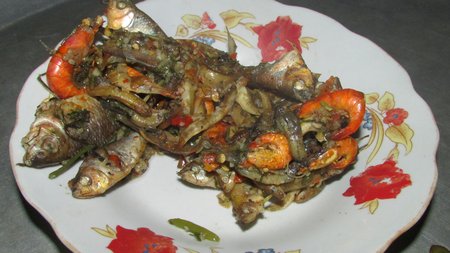
After the dinner, the wife started weaving in a dim light when her children were watching a Thai movie. The weaving had a very complicated pattern and it was beautiful. She used weaving machine rhythmically and the sound of the weaving machine was like a music.
夕飯の後、奥さんは子供達がタイ映画を見ている間、薄明かりで機織りを始めた。複雑な美しい模様だった。リズムにのって機織り機が動き、その音は音楽のようだった。
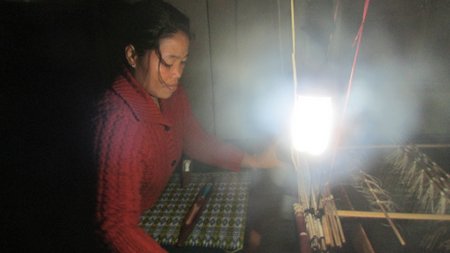
We went to bed around 8pm as it was extremely cold in spite of being inside the house. Two days in a row without shower with all the dust made us a bit uncomfortable but the tiredness soon took over and was out of our mind. My fingers and toes were frozen again and I couldn’t sleep well….
家の中にいるにもかかわらず、非常に寒かったので、まだ8時だというのに、私達は寝ることにした。埃まみれだというのに、2日続けてシャワーを浴びていなかったので、少し気持ちが悪い気がしたが、疲れていたので、そんなことはすぐに頭から去ってしまった。またしても手足の先が冷え切ってしまい、私はまたよく寝られなかった。
The next morning, we heard the loud music played by the daughter who was getting ready to go to school. We slowly got up and packed everything. When we went outside, the man and grandpa made a fire, sitting and warming up their body so we also joined them. We learned how to say cold in Lao in this cold weather and kept saying “Nau”. It was very foggy and the mist come out from the pond. It was rather mysterious and beautiful.
翌朝、まず聞こえてきたのは、学校に行く支度をしているこの家の娘さんがかけた大きい音の音楽。私達はゆっくり起き上がって、荷物を纏めた。外に出るとおじさんと、お爺さんが火を焚いて、座って体を温めていたので、私達も一緒に火のそばで体を温めさせてもらった。この寒さで、私達はラオス語で「寒い」という言葉を覚え、何度も「ナウ!ナウ!」と繰り返し言い続けた。この日は朝霧が深く、池から霧が立つ様子はなんともミステリアスで、美しかった。
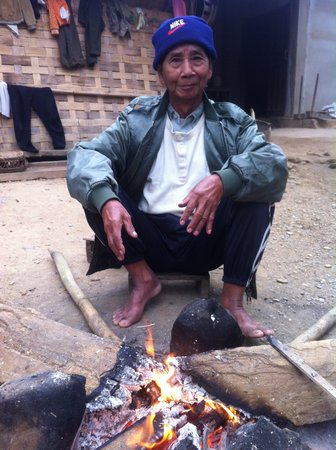
When we said good bye to this lovely family, they were surprised that we were leaving without having a breakfast. We left this beautiful village with some good memory of this family. The world is filled with great souls…
私達がこの素晴らしい家族に別れを告げると、彼らは私達が朝食を食べずに出て行くことに驚いていた。わたは、この家族との良い思い出を胸にこの美しい村を離れた。世界は素晴らしい魂で溢れている感じがした。
It was so cold and we couldn’t enjoy the down hill for the first time in this journey. The fingers were numb and the knees started to hurt. When we found a mechanic shop which was making a fire in front of the shop, we had to stop and warm our body and wait for the sun to come out.
あまりの寒さに、この旅で初めて下り坂を楽しめなかった。指先の感覚がなくなり、膝が痛み出した。バイクの修理屋さんがお店の前で火を焚いているのを見つけると、自転車を止めて、日が出てくるまで、焚き火のそばで体を温めさせてもらった。
As soon as the sun came out and we went back on the road and soon we had to take some layers off. It was another mountain journey. But we started to see some red and pink flowers and we realized that we were getting closer to the bottom of the mountain.
日が出てくると同時に私達はまた自転車を走らせた。しばらくするとすぐに暑くなり、重ね着していたものを何枚か脱がなければならなかった。また山道の旅が始まった。少しずつ赤やピンクの花々を見かけるようになり、山の麓に近づいてきたことがわかった。
We stopped for a breakfast. It was our last noodle soup breakfast!(hopefully) It was not even a restaurant but they sold instant noodles. Sunil asked if they gave us some hot water for noodles and the lady actually cooked noodles with some veg and gave us sticky rice as well (Everything was charged:-)).
小さい村で、朝食。これが私達の最後のスープ麺の朝食 (になるといいな)!ここはレストランではなく、インスタント麺を売っているお店だったのだが、スニルが麺を買った時にお湯をもらえないか聞いたら、お店の女性が野菜も入れて、スープ麺を作ってくれ、おこわも持ってきてくれた。(もちろんお金はとられましたけど。(笑)
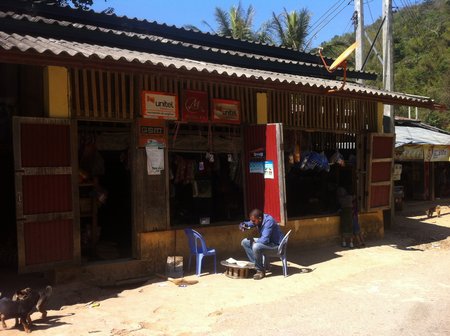
The children started to come and see us and bikes. Their cheeks were red and covered with dust but cheerful and had innocent smiles as any Lao kid.
村の子供達が私達と自転車を見に近寄ってきた。頬は赤く土埃まみれな子供達。ラオスのどの村でも見かける子供同様元気で無邪気な笑顔。
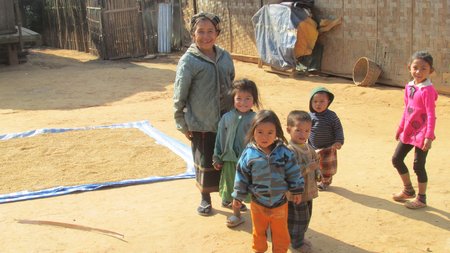
My heart melt every time I saw these small kids taking care of their siblings through out the trip.
山中のサイクリング中に村々で、小さい子供が、自分の妹や弟をオブ紐で背負って世話をしているのをよく見かけたが、そんな姿を見るたび、心にジンときた。
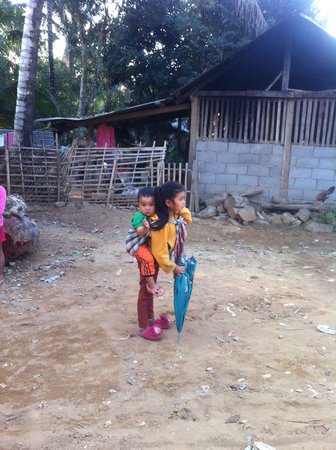
After breakfast we rode more and the scenery started to change and suddenly we came to a town and the first thing what we thought was, we could eat something other than noodle soup!! It was the Chinese New Year. So we celebrated the Chinese New Year with the Chinese feast for our early dinner.
朝食後、さらに自転車を走らせると、いつの間にか風景が変わり、突然町に辿り着いた。まず最初に私達が思ったことは、、、スープ麺以外の物が食べられる!と言う事だった。その日は、ちょうど中国のお正月。中国の新年、早めの夕飯を中華料理のご馳走でお祝いした。
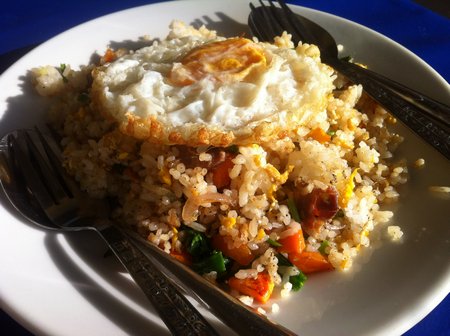
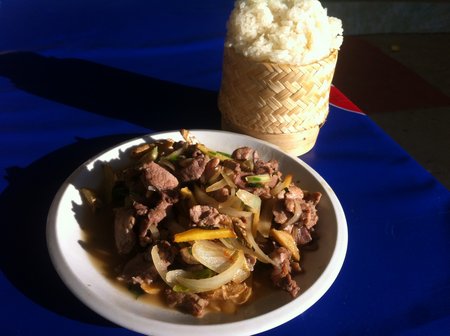
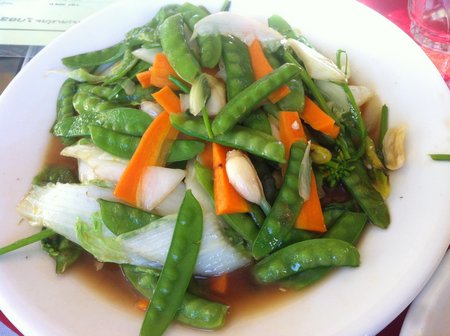
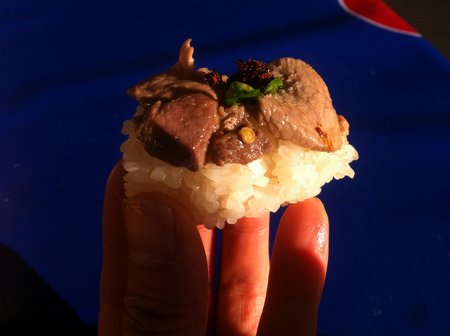
So far after Luang Prabang we had hardly spent $10, of course we were surviving on noodles and spent lavish $10 for this early dinner :).
ロンプロバングを出た後、毎日スープ麺ばかりだったので、使った費用は10ドルもいっていなかったが、この早めの夕飯だけで贅沢に(笑10ドル使う。
We’ll miss the small villages and beautiful scenery which took us 100 years back but I won’t miss the killing up hills for sure. We really learned and appreciated the human’s basic needs such as water, fire, shelter and kindness in this mountain journey. And what we need now? A good hot shower!
私達を100年前の世界にタイムスリップさせた小さい村々や美しい風景が懐かしくなると思う。しかし、あのすごい登り坂は、思い出すのも御免である。この山中山の旅で私達は、水、火、寝る場所、人の優しさといったような基本的に人間が生きていくために必要なものの有り難さを再確認した。そして、私達に今一番必要なものと言えば、、、熱い熱いシャワー!
In total we rode close to 200 km in 3 days and we still have 225 km to reach Vietnam.
3日間での自転車走行距離は計200キロ。ベトナムまで、後225キロである。